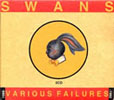
Considering most of the "mid period" Swans material has been out of print for years and exists only in this compilation now says a lot about both Michael Gira's stance on the era, and perhaps as much about the bulk of the fans as well. The title is a bit of a clue, too. While the recent works have been in print since their inception, and the sprawling, but exhaustive collections of older material, this has been the forgotten era. Here songs were picked by Gira out of personal preference, with a smattering of b-sides and World of Skin material. But, is this compilation sufficient to represent this period as a whole?
Opinions vary widely on what Swans recorded between 1988 and 1992.As demonstrated over the past few weeks here, I think The Burning World is under-appreciated, but not essential, Lucas Schleicher sees White Light from the Mouth of Infinity as concise and essential, while Anthony D'Amico thinks Love of Life could benefit with some of the fat removed.However, all three of us see that there is a lot of great music spread across these three albums, amongst the most maligned in the band's catalog.
Part of the reason for this is surely that the band was in transition at this time.Their early career was so defined by being "heavy" that they had no choice but to try something else.Fans are always quick to point out how essential albums like Cop and Filth are, but would the band have survived if they kept doing the repetitive sludge thing?Probably not.However, they transitioned from that from of heaviness to a more complex, nuanced version with Soundtracks for the Blind:not so much massive riffs and brutal vocals, but a heaviness defined by more diverse, drone oriented structures and atonal, abrasive textures.The heaviness never went away though, but during this middle point it was one more of emotional and psychological weight.
Both "God Damn the Sun" (from The Burning World) and "Failure" (from White Light) carry this weight well.Gira's post-Swans Angels of Light project often played these songs in concert, and he has performed them many times on solo appearances, so there's obviously some strength to them in his eyes.While comparatively sparse when placed against their older material, the country/folk arrangements belie the sound of depression so deep they somehow manage to transcend cliché and enter a purely soul-crushing realm.Here, though, what I have always considered the third part of a trilogy is included."Blind," originally from Gira's Drainland solo album, comes from a similar emotional void, but has more of a resigned, rather than self-punishing feeling to it.Gira's vocals and acoustic guitar, along with the string accompaniment, weave together one of my favorite songs that he has ever been involved with, and also serves as the blueprint for what would become the Angels of Light.
Other exclusive material presented here isn't so essential.An instrumental version of "Unfortunate Lie" appears on the first disc, while the previously single-only Jarboe version of "Love Will Tear Us Apart" is on the second disc.While I have always had mixed emotions about the histrionic Jarboe vocal tracks ("Can't Find My Way Home," "I Remember Who You Are," both of which are included here for examples), this one is just appalling.Perhaps I'm biased because if I want to hear that song, I'll listen to Joy Division, but her version is just so rife with art school forced drama and pretension that I don't think I've ever listened to the whole thing in my 11 years of owning this set.And I don't think I ever will.Gira's version with more musical accompaniment, which isn't on here, is stronger by far in comparison but, again, unnecessary.Apparently a more recent reissue of this compilation drops this and the acoustic take of "New Mind" in favor of "The Sound of Freedom" from Love of Life.Now there's a form of Stalinist revisionism I can get behind, but the acoustic version of "New Mind" is actually pretty good.Even though it has a rough demo sound to it, it interests me to hear one of the more traditionally "heavy" Swans tracks appear in this form.
I have mixed feelings on this as a compilation, because on one hand this was my first exposure to the material:it was the first Swans release I bought after owning a burned copy of Cop/Young God/Greed/Holy Money, so I was at first taken aback by the drastically different sound, but I still instantly loved much of what was there.It wasn't until a few years later I was able to track down the individual albums at reasonable prices.For that reason alone, some of the sequencing on here is more familiar and strong on its own.Putting the structurally more mellow "Black Eyed Dog" between the monolithic "Miracle of Love" and "The Golden Boy Who Was Swallowed by the Sea" feels right to me, as does the beautifully sparse b-side "Picture of Maryanne" preceding the almost industrial pummel "Amnesia."But, the original albums, even with their unpleasant moments, have a greater sense of cohesiveness to them.While flawed, all three work as unified pieces on their own.
As of now, opinion is irrelevant because the only way to hear the original material is to track down the pricy releases or find other, more nefarious means of hearing them.Personally, I'd agree with Lucas Schleicher and advocate expanded reissues of all three as being the best option, because that would cover the best of both worlds, but I don’t see that happening in the foreseeable future, sadly.
samples:
 
Read More


